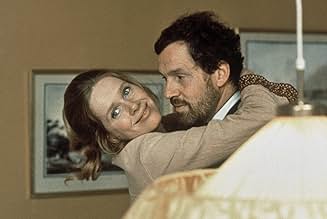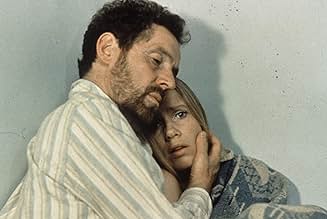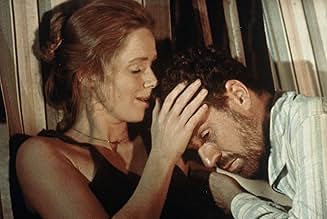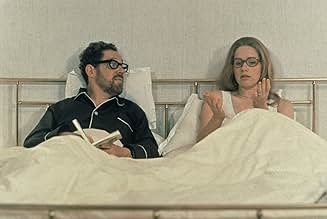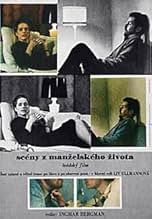IMDb RATING
8.5/10
18K
YOUR RATING
Ten years within the marriage of Marianne and Johan.Ten years within the marriage of Marianne and Johan.Ten years within the marriage of Marianne and Johan.
- Awards
- 3 wins total
Browse episodes
Featured reviews
Scenes from a Marriage (the TV version, even as the theatrical cut is still very good and worth the time if the only copy available) is an intimate, naturalistic portrait of a couple, who at first are seemingly happy, then aren't, then try and find out where they go wrong. It's involving drama at its nexus, and for those who love the theater it's an absolute must see (aside from the theme, no music, all talk). Johan and Marianne are two of Bergman's most interesting, true characters (among his countless others) that he's ever presented, and like many other film artists, you can tell he's lived through at least some if not most of the emotions and trials these characters have been through.
Along with several supporting characters, two of the more notable ones played by Bibi Andersson and Malmjso are a perfect contrast in the first episode of the series. The conflicts that are established throughout the series never pay-off in a mis-fire. Craft-wise there is almost no style except for the minimal lighting by the great Sven Nykvist. And the dialog that goes on between the two leads goes from amusing to tragic, from romantic to bleak, and with all the emotions that I (as one who's never been married) can only guess can be as so. Bergman's script would be just that, a poignant, very profound lot of bits between two people more or less on paper, if not for Liv Ullmann and Erland Josephson. They turn on the emotions intuitively, like they've been these people somewhere else at some other time. Or rather, the husband and wife don't have very complicated jobs or economic situation, but the problems lie on the emotional plane, and the intellect they try to put to it. Johan loves another woman, how does that affect Marianne? Marianne asks for a divorce, how does that affect Johan? What will they do to cope? These are questions Bergman poses for his actors, among plenty of others, and they pull off the emotional cues off of each other like the most wonderful theatrical pros.
It's hard to find anything wrong with their acting, cause they don't over-do it (unless you're not into Marianne's changes in feeling in some scenes, which could be understandable), and the bottom line is that despite it being in Europe thirty years ago, it's highly possible these people could be in your house, or in your neighbor's house. Ullmann's Marianne is the 180 of her character from Persona, who could only let out emotions once or twice, mostly as an observer. Josephson's Johan is complex behind is usually sarcastic and simple demeanor- what drives him to do what he does in episode three, or in four? What will the conclusion lead to? Bergman creates a drama that is never boring, never diluted, and asks us to search for ideas about love and relationships we sometimes try and push away. It's a superb, concise treatise about the nature of falling in and out of love, how to differentiate what love is, and essentially what a marriage is. I can't wait to see the sequel, Saraband, which is Bergman's (definite) last film.
Along with several supporting characters, two of the more notable ones played by Bibi Andersson and Malmjso are a perfect contrast in the first episode of the series. The conflicts that are established throughout the series never pay-off in a mis-fire. Craft-wise there is almost no style except for the minimal lighting by the great Sven Nykvist. And the dialog that goes on between the two leads goes from amusing to tragic, from romantic to bleak, and with all the emotions that I (as one who's never been married) can only guess can be as so. Bergman's script would be just that, a poignant, very profound lot of bits between two people more or less on paper, if not for Liv Ullmann and Erland Josephson. They turn on the emotions intuitively, like they've been these people somewhere else at some other time. Or rather, the husband and wife don't have very complicated jobs or economic situation, but the problems lie on the emotional plane, and the intellect they try to put to it. Johan loves another woman, how does that affect Marianne? Marianne asks for a divorce, how does that affect Johan? What will they do to cope? These are questions Bergman poses for his actors, among plenty of others, and they pull off the emotional cues off of each other like the most wonderful theatrical pros.
It's hard to find anything wrong with their acting, cause they don't over-do it (unless you're not into Marianne's changes in feeling in some scenes, which could be understandable), and the bottom line is that despite it being in Europe thirty years ago, it's highly possible these people could be in your house, or in your neighbor's house. Ullmann's Marianne is the 180 of her character from Persona, who could only let out emotions once or twice, mostly as an observer. Josephson's Johan is complex behind is usually sarcastic and simple demeanor- what drives him to do what he does in episode three, or in four? What will the conclusion lead to? Bergman creates a drama that is never boring, never diluted, and asks us to search for ideas about love and relationships we sometimes try and push away. It's a superb, concise treatise about the nature of falling in and out of love, how to differentiate what love is, and essentially what a marriage is. I can't wait to see the sequel, Saraband, which is Bergman's (definite) last film.
The lawyer Marianne (Liv Ullmann) and the professor Johan (Erland Josephson) have been married for ten years, having two daughters. One night, Johan tells Marianne that he met a young woman, Paula, and he will travel to Paris with her for eight months. Caught by surprise, the perfect world of Marianne falls apart, and she starts living alone. Along the next ten years, they meet each other in different situations, in a relation of love and hate for each other. The first time I watched this theatrical movie I was single and was less than twenty years old. In that occasion, I loved the performances of Liv Ullmann and Erland Josephson, but I found the story too long. Today, with twenty-five years of marriage, I have watched this film again on video: what a masterpiece! Ingmar Begman presents an amazingly credible and honest story of the relationship of a couple along twenty years of their lives. Liv Ullmann is so beautiful and has such a stunning performance that impressed me. Erland Josephson also has a magnificent performance as an insecure but sensitive man, full of contradictions and without knowing how to make a decision about his feelings. Unfortunately the VHS spoken in Swedish distributed by Concorde in Brazil has many dialogs without subtitles. Sometimes, four, five sentences are omitted in the translation, or a long speech of a character is resumed to a five or six words sentence. A crime against the viewer! Highly recommended for married couples as a lesson of life. My vote is ten.
Title (Brazil): `Cenas de um Casamento' (`Scenes From a Marriage')
Title (Brazil): `Cenas de um Casamento' (`Scenes From a Marriage')
After "Wild Strawberries," this is perhaps my favorite Bergman movie, though be warned: it will take the wind out of you, especially if you watch the full five-hour version in a condensed period of time, as I did.
Liv Ullmann and Erland Josephson create perhaps too realistic a version of marriage in this emotionally bruising film. When Marianne (Ullmann) finds out that Johan (Josephson) has been cheating on her and has decided to leave her, the safe, secure world she has built around her crumbles. She plays Marianne as a wife blind to her own husband's unhappiness and embarrassed that she didn't see it coming, and her's is a convincing portrait of a woman whose partner has decided long before her that what they have isn't working.
Josephson makes Johan into a contemptible ass, but he still manages to earn our sympathy. It's easy to dislike Johan but difficult to hate him, so we're in many respects thrust into the same emotional straight jacket as Marianne.
The saddest thing about "Scenes from a Marriage" is how much affection and love there actually is between these two people, and how it's going to waste. When they get angry, they lash out to hurt one another with words and even with fists at one point. There are tears, laughs, reveries. It's obvious that there wouldn't be the need for all this if there wasn't so much ingrained affection between them, and it's tragic to see them become each other's enemy rather than each other's ally.
For a very good if not quite as brilliant sequel to this film, see "Saraband," which has Marianne visiting Johan for the first time in many years after each has established a life of his/her own without the other. It brings a peaceful sense of closure and in many ways stitches up the raw wound left by the first film.
Grade: A
Liv Ullmann and Erland Josephson create perhaps too realistic a version of marriage in this emotionally bruising film. When Marianne (Ullmann) finds out that Johan (Josephson) has been cheating on her and has decided to leave her, the safe, secure world she has built around her crumbles. She plays Marianne as a wife blind to her own husband's unhappiness and embarrassed that she didn't see it coming, and her's is a convincing portrait of a woman whose partner has decided long before her that what they have isn't working.
Josephson makes Johan into a contemptible ass, but he still manages to earn our sympathy. It's easy to dislike Johan but difficult to hate him, so we're in many respects thrust into the same emotional straight jacket as Marianne.
The saddest thing about "Scenes from a Marriage" is how much affection and love there actually is between these two people, and how it's going to waste. When they get angry, they lash out to hurt one another with words and even with fists at one point. There are tears, laughs, reveries. It's obvious that there wouldn't be the need for all this if there wasn't so much ingrained affection between them, and it's tragic to see them become each other's enemy rather than each other's ally.
For a very good if not quite as brilliant sequel to this film, see "Saraband," which has Marianne visiting Johan for the first time in many years after each has established a life of his/her own without the other. It brings a peaceful sense of closure and in many ways stitches up the raw wound left by the first film.
Grade: A
Ohmygod. Liv Ullman really deserved an Oscar for this one, as did Bergman. WOW- not many movies are this honest, this heartbreaking, this true, and this tumultuous- we see two people, in and out of a relationship over fifteen years, experiencing all the pain, loss, love, hate, anger, jealousy, denial, sadness, and so on that finding one's soul-mate brings, stretched out long-term.
Not many movies even come close to this one's brutality in its genuine awareness of people. Most modern films (and television, for that matter) cannot even come close to the psychological precision of Bergman's films. Perhaps "Scenes from a Marriage" is his best work- more accessible than "Wild Strawberries", more compelling than "Persona." This is definitely a film to seek out.
Not many movies even come close to this one's brutality in its genuine awareness of people. Most modern films (and television, for that matter) cannot even come close to the psychological precision of Bergman's films. Perhaps "Scenes from a Marriage" is his best work- more accessible than "Wild Strawberries", more compelling than "Persona." This is definitely a film to seek out.
I used to think that I knew a thing or two about marriage having been married for as long as I have but nothing from my experience had prepared me for the merciless and deep dissection of Marriage: Bergman Style. When we meet Johan and Marianne for the first time, they have been happily (or so it seems) married for ten years. They have two daughters; they are still young, very attractive, healthy, educated, well off, and they seem to love each other very much. But Bergman is not interested in happy families all happy families are happy in the similar ways. Like Tolstoy many years before him, Bergman explores the second part of the formula All unhappy families are unhappy in their unique ways.
Bergman and his leading actors Liv Ullmann and Arland Josephson give one of the most truthful, honest, heartbreaking and credible portraits of a couple, one of the most intense character studies ever done on film. For five hours, we share twenty years from the lives of Johan and Marianne as well as their love, hate, misunderstandings, insecurities, anger, jealousy, denial, sadness, pain, despair, and loss. We witness the moments of incredible tenderness and unexpected and shocking violence, both physical and mental. There are no depth that they have not descended in the search of themselves and the meaning of their relationship.
There are actually four marriages Bergman studies in "Scenes from a Marriage" none of them is happy, all are miserable. Bergman does not deny the possibility of finding a soul mate but his opinion on the modern marriage is quite pessimistic.
It felt like Bergman was saying - marriage is dead, long live love. For hours after the film was over, I could not shake off the sadness and pessimism of it. Only later I realized that even if four marriages in Bergman's film were disastrous, it does not necessarily mean that all couples in the world are or have to be that miserable. Bergman wrote and directed Scenes from a Marriage in 1973 when he was in his 5-th marriage, the one that would last for 24 years until his wife died. He brought in the screenplay (I think so but I may be wrong) the bitterness, resentment, anger and disappointments from his previous four marriages - maybe that's why the film is sometimes almost impossible to watch?
"Scenes from a Marriage" is a masterpiece but it may leave you devastated and emotionally exhausted. I watched the original 5-hours TV version and did not even bother with three hours version. 10/10
Bergman and his leading actors Liv Ullmann and Arland Josephson give one of the most truthful, honest, heartbreaking and credible portraits of a couple, one of the most intense character studies ever done on film. For five hours, we share twenty years from the lives of Johan and Marianne as well as their love, hate, misunderstandings, insecurities, anger, jealousy, denial, sadness, pain, despair, and loss. We witness the moments of incredible tenderness and unexpected and shocking violence, both physical and mental. There are no depth that they have not descended in the search of themselves and the meaning of their relationship.
There are actually four marriages Bergman studies in "Scenes from a Marriage" none of them is happy, all are miserable. Bergman does not deny the possibility of finding a soul mate but his opinion on the modern marriage is quite pessimistic.
It felt like Bergman was saying - marriage is dead, long live love. For hours after the film was over, I could not shake off the sadness and pessimism of it. Only later I realized that even if four marriages in Bergman's film were disastrous, it does not necessarily mean that all couples in the world are or have to be that miserable. Bergman wrote and directed Scenes from a Marriage in 1973 when he was in his 5-th marriage, the one that would last for 24 years until his wife died. He brought in the screenplay (I think so but I may be wrong) the bitterness, resentment, anger and disappointments from his previous four marriages - maybe that's why the film is sometimes almost impossible to watch?
"Scenes from a Marriage" is a masterpiece but it may leave you devastated and emotionally exhausted. I watched the original 5-hours TV version and did not even bother with three hours version. 10/10
Did you know
- TriviaAccording to an interview with Ingmar Bergman, after the TV mini-series was broadcast in Sweden, the divorce rate in Sweden increased substantially and the number of married couples who seek marriage counseling also doubled.
- Crazy creditsThe end credits aren't shown on-screen but read by director and writer Ingmar Bergman, while "a beautiful picture of Fårö" is shown (different for each episode). Bergman himself is not credited at all.
- Alternate versionsBergman prepared a four-hour version of "Scenes from a Marriage," hoping it would be shown as a two-part film. It never appeared in the US, although the original six-hour mini-series was shown on PBS after the 168 minute cut had played theatrically.
- ConnectionsEdited into Scènes de la vie conjugale (1974)
- SoundtracksConcerto for violin, strings & continuo in B flat major, Op. 10, No. 1
(uncredited)
Written by Tomaso Albinoni
A short extract is played during the very beginning and end of each episode (it's not featured in the theatrical version)
- How many seasons does Scenes from a Marriage have?Powered by Alexa
Details
- Release date
- Country of origin
- Official site
- Language
- Also known as
- Scenes from a Marriage
- Filming locations
- Production company
- See more company credits at IMDbPro
- Runtime
- 50m
- Sound mix
- Aspect ratio
- 4:3
Contribute to this page
Suggest an edit or add missing content

